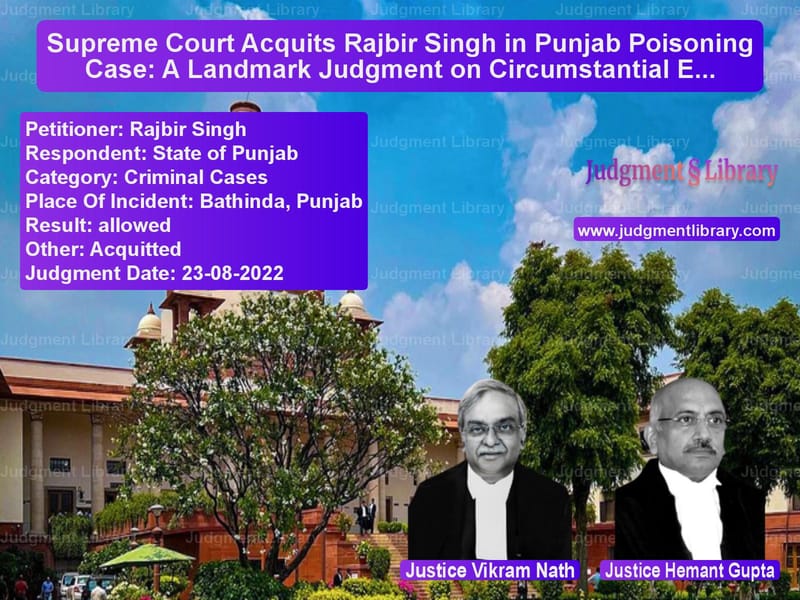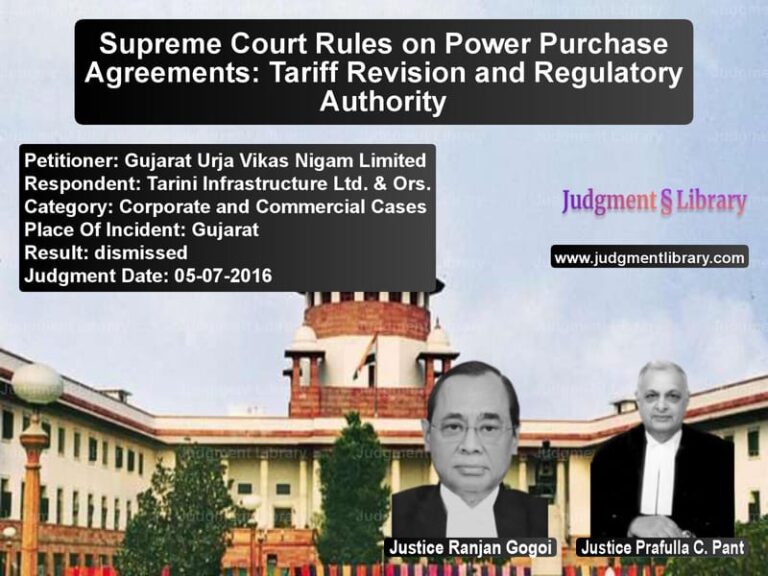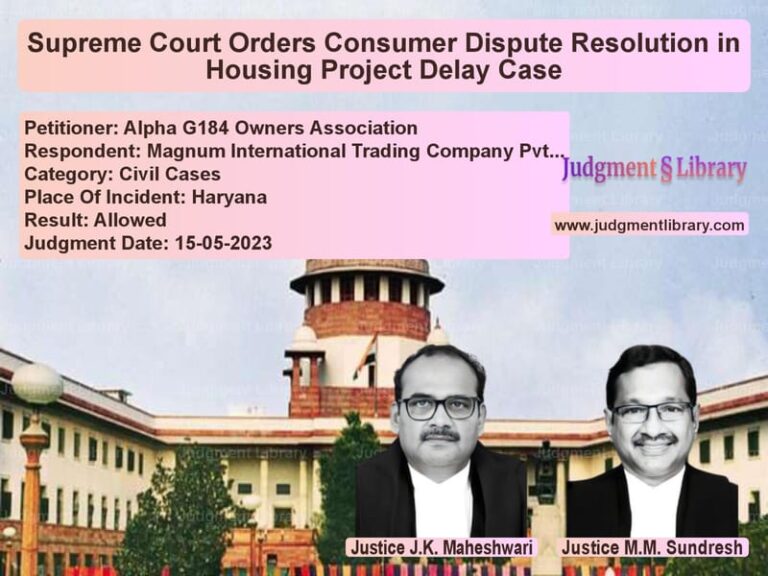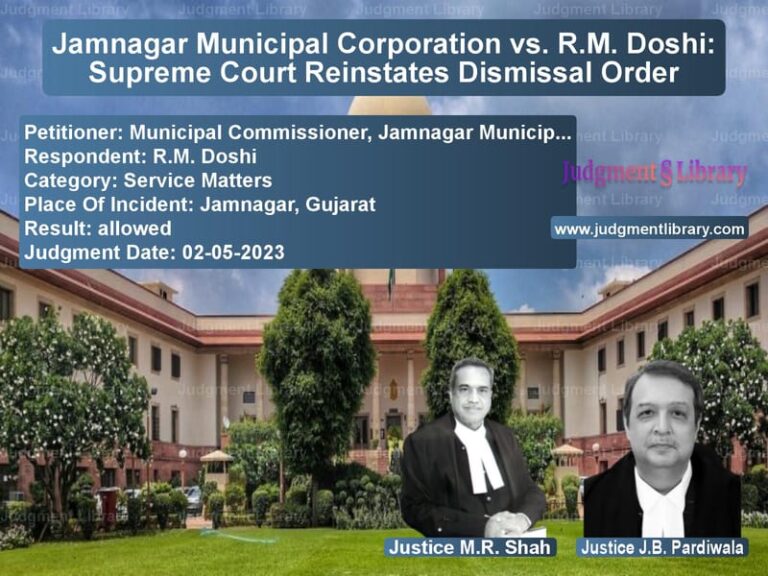Supreme Court Acquits Rajbir Singh in Punjab Poisoning Case: A Landmark Judgment on Circumstantial Evidence
The Supreme Court of India, on August 24, 2022, delivered a landmark judgment in the case of Rajbir Singh vs. State of Punjab. The case revolved around a murder conviction under Section 302 of the Indian Penal Code (IPC), where Rajbir Singh was accused of poisoning Kuldeep Kaur by allegedly mixing a toxic substance in the milk supplied to her family. The conviction had been upheld by the Punjab and Haryana High Court. However, the Supreme Court, after thoroughly examining the evidence, found multiple inconsistencies in the prosecution’s case and acquitted Rajbir Singh by granting him the benefit of the doubt.
This judgment is significant as it reinforces the principles of criminal jurisprudence regarding circumstantial evidence and the necessity of proving guilt beyond reasonable doubt.
Background of the Case
The case stemmed from an incident on September 18, 2000, in Bathinda, Punjab. The prosecution alleged that Rajbir Singh, who ran a dairy business, had supplied poisoned milk to the complainant’s family, leading to the death of Kuldeep Kaur. The motive suggested by the prosecution was a financial dispute, as Rajbir Singh had purportedly taken a loan of Rs. 1 lakh from the complainant, Joginder Singh, and was reluctant to repay it.
According to the prosecution:
- Joginder Singh’s son, Gursharan Singh, had purchased one kilogram of milk from Rajbir Singh’s dairy.
- The milk was later used to prepare a meal for Kuldeep Kaur, who found it bitter.
- She soon experienced severe discomfort and was taken to the hospital, where she passed away.
- A police investigation led to Rajbir Singh’s arrest, and chemical analysis reports indicated the presence of organophosphorus (a toxic insecticide) in the milk.
On the basis of this circumstantial evidence, the Sessions Court convicted Rajbir Singh and sentenced him to life imprisonment with a fine of Rs. 1,000. The Punjab and Haryana High Court upheld the conviction. Rajbir Singh then appealed to the Supreme Court.
Arguments from the Petitioner (Rajbir Singh)
The defense counsel made the following arguments before the Supreme Court:
- The case was entirely based on circumstantial evidence without any direct proof linking the appellant to the crime.
- No eyewitnesses saw Rajbir Singh mixing poison in the milk.
- The alleged financial dispute was unsubstantiated as the original promissory note was never produced in court.
- The milk was kept in the complainant’s house for hours before being consumed, leaving open the possibility of tampering.
- The prosecution had not proved that Rajbir Singh possessed organophosphorus, nor was any purchase of the poison traced to him.
- The forensic reports were inconsistent, and the sample was tampered with before reaching the forensic lab.
Arguments from the Respondent (State of Punjab)
The prosecution countered these claims, arguing:
- The chain of events strongly indicated Rajbir Singh’s involvement.
- The presence of organophosphorus in the milk and the victim’s viscera proved poisoning.
- The accused had a clear motive—to avoid repaying the Rs. 1 lakh loan.
- Rajbir Singh had control over the milk supply, which made it likely that he had poisoned it.
Supreme Court’s Observations
1. Gaps in Circumstantial Evidence
The Supreme Court emphasized that in a case based on circumstantial evidence, the prosecution must establish an unbroken chain of events leading to the accused’s guilt:
“The prosecution must prove beyond reasonable doubt that no other hypothesis except the guilt of the accused is possible.”
The Court found multiple missing links in the prosecution’s case.
2. Inconsistencies in Chemical Reports
The forensic reports were crucial to the case, but the Court found that:
- The forensic sample was received at the lab in an unsealed condition, allowing for possible tampering.
- There was a two-month delay in sending the samples for examination.
- The presence of organophosphorus in the viscera did not automatically prove that Rajbir Singh was responsible.
3. Possibility of Third-Party Tampering
The Court noted that the milk was kept in the complainant’s house for five hours before being consumed:
“It cannot be ruled out that the milk was contaminated during this period.”
4. Lack of Proof of Poison Purchase
The prosecution failed to present any evidence showing that Rajbir Singh had purchased or possessed organophosphorus:
“Without proof of access to poison, the prosecution’s case remains weak.”
Final Judgment
The Supreme Court ruled:
- Rajbir Singh was acquitted due to a lack of conclusive evidence.
- The High Court’s and Trial Court’s judgments were set aside.
- He was granted the benefit of the doubt and ordered to be released.
Implications of the Judgment
This ruling has major implications:
- Reinforces the necessity of direct evidence: Convictions cannot be based on weak circumstantial evidence.
- Ensures forensic integrity: The case highlights the importance of handling forensic samples properly.
- Prevents wrongful convictions: It underscores the need for courts to scrutinize every aspect of circumstantial evidence.
Conclusion
The Supreme Court’s judgment in Rajbir Singh vs. State of Punjab is a landmark ruling on circumstantial evidence and wrongful conviction. By acquitting the accused, the Court reaffirmed the fundamental principle that suspicion, no matter how strong, cannot replace proof beyond reasonable doubt. This case serves as a vital precedent for future criminal trials based on indirect evidence.
Petitioner Name: Rajbir Singh.Respondent Name: State of Punjab.Judgment By: Justice Vikram Nath, Justice Hemant Gupta.Place Of Incident: Bathinda, Punjab.Judgment Date: 23-08-2022.
Don’t miss out on the full details! Download the complete judgment in PDF format below and gain valuable insights instantly!
Download Judgment: rajbir-singh-vs-state-of-punjab-supreme-court-of-india-judgment-dated-23-08-2022.pdf
Directly Download Judgment: Directly download this Judgment
See all petitions in Murder Cases
See all petitions in Bail and Anticipatory Bail
See all petitions in Custodial Deaths and Police Misconduct
See all petitions in Judgment by Vikram Nath
See all petitions in Judgment by Hemant Gupta
See all petitions in allowed
See all petitions in acquitted
See all petitions in supreme court of India judgments August 2022
See all petitions in 2022 judgments
See all posts in Criminal Cases Category
See all allowed petitions in Criminal Cases Category
See all Dismissed petitions in Criminal Cases Category
See all partially allowed petitions in Criminal Cases Category







